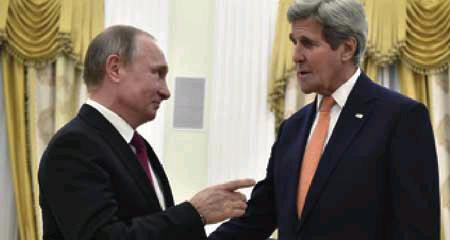A Warming of Relations?
2016-05-04ByYuLintao
By+Yu+Lintao
The Russian-U.S. relationship seems to be showing signs of improvement after two years of an impasse as a result of the Ukrainian crisis. During U.S. Secretary of State John Kerrys trip to Moscow in late March, the two sides held a rare in-depth discussion on several regional issues and bilateral relations. Observers say that it was the most cordial interaction between the two countries over the past two years.
The two sides agreed to continue coordination of actions to consolidate a ceasefire in Syria and push for direct talks between the Syrian Government and the opposition in an effort to complete the countrys political transition and drafting of the new constitution before August. They also reached consensus on coordinating efforts to fight the so-called“Islamic State” extremist group and regularly reviewing bilateral relations to come up with solutions for practical issues.
This benign interaction has indeed rarely been seen since 2013. However, it still seems out of the question that mutual trust between Moscow and Washington is deepening. More likely, the closer relations are based on the practical needs of both sides.
The Syrian crisis has become a headache for the United States in its endeavor to lessen its role in the Middle East. With less than nine months left of his presidency, President Barack Obama is unwilling to take on additional problems and has no intention of sending combat troops to Syria to directly intervene. Some critics say that Washingtons support of the Syrian opposition has been largely proven ineffective. If the Obama administration can push for a political settlement to the crisis, it would become yet another important diplomatic legacy for Obama. His other achievements include the Iranian nuclear deal and a thawing of U.S.-Cuban relations. Moscows role in Syria is irreplaceably significant, and there is ample room for cooperation between the United States and Russia to come to a solution to end the ongoing civil war.
On the Russian side, the State Duma(lower house) election is due to take place in September. In its effort to maintain political stability, Moscows focus is on solving the current economic difficulties and improving peoples livelihoods. President Vladimir Putin and his government now need to improve relations with the West if they want to see Ukraine-related sanctions on Russias economy eased. Russian troops military operations in Syria from last September to March have consolidated President Bashar al-Asads government and helped safeguard Moscows strategic influence in the Middle East. Against this backdrop, it is also more reasonable for Moscow to maintain these achievements by conversing and restoring relations with the West.
However, a large gap remains between Russia and the United States concerning the Syrian crisis with both countries aspiring to exert their influence in the region. Moscow and Washington should focus on their common goals to come to a compromise.
After experiencing intense direct and indirect confrontations, both Moscow and Washington seem to be considering redefining their bilateral relations. Some observers in Washington say that the two countries should not continue the confrontation. At the same time, the two cannot return to the honeymoon era when Russia was first granted membership of the Group of Eight in 1997. They believe the best mutual positioning now is a “limited partnership.” Although the two sides cannot seek cooperation at the global level, they can conduct pragmatic collaboration on specific issues where they share a common interest, such as the Syrian crisis.
Such a limited partnership is a promising approach for the two countries to interact in the future. Washington and Moscow share some common challenges that they need to face together, but their mutual trust is almost bankrupt after multiple confrontations over the past two years. Russias new national security strategy defines NATO and the United States as major threats, while the United States has presented Russia as a major factor impacting global stability.
On April 14, a Russian fighter jet flew close to a U.S. reconnaissance aircraft over the Baltic Sea, which was widely reported by the Western media. Such mid-air encounters had allegedly been frequent. But they were rarely reported as the two militaries have a crisis management mechanism as well as a tacit agreement. But this time, U.S. officials released the story to the media. Why? It could be interpreted as a warning to Moscow that easing bilateral relations is not that easy.
